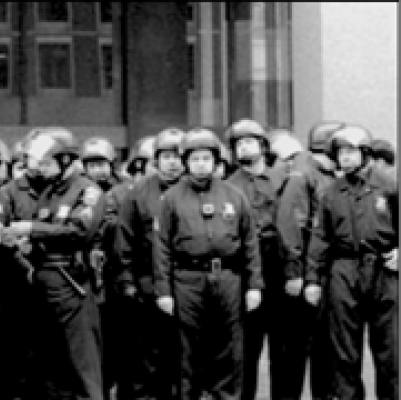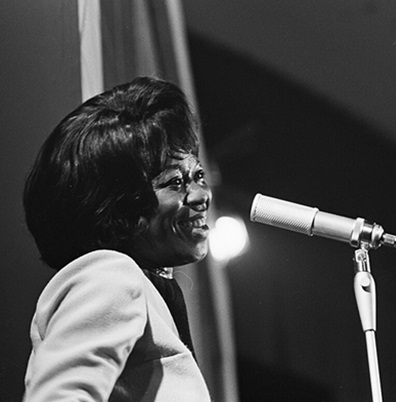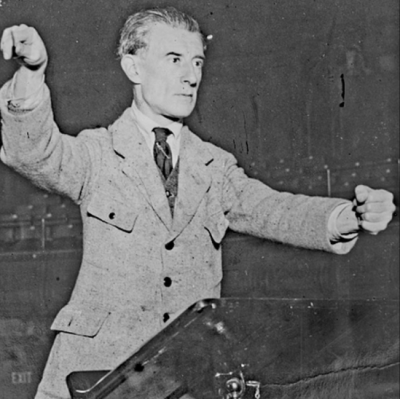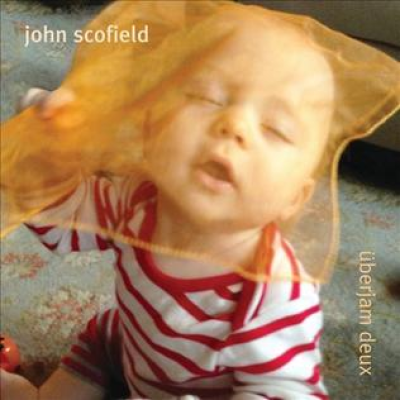“Always Follow the Pork Pie Hat” – a poem by Michael L. Newell
thick as soup
the summer air
and the music
rolling from nearby window
Mingus’s big band
in wild abandon
March 27th, 2025
thick as soup
the summer air
and the music
rolling from nearby window
Mingus’s big band
in wild abandon
March 27th, 2025
Eric Dolphy was one of jazz music’s first true multi-instrumentalists, and a pioneer of avant-garde technique. His life cut short in 1964 at the age of 36, his brilliant career touched fellow musical artists, critics, and fans of jazz music through his innovative work as a composer and bandleader. Jonathon Grasse’s Jazz Revolutionary effectively inspires readers to experience a deep and personal exploration of this unique artist’s historic recorded works, reminding us of the complexity of his biography along the way. He discusses his book – the first full biography of Eric Dolphy – in a December, 2024 interview.
...December 28th, 2024
Mingus howling, his bass rumbling in their faces,
Shouting yeah! Yeah, oh yeah! The insistent barking growl.
Their chains beat loose by the savage blues that chases.
December 14th, 2024
Like her or not, readers of this site will enjoy learning that Vice President Kamala Harris is a fan of jazz music. Witness this recent clip (via Youtube) of her emerging from a record shop…
...July 26th, 2024
The shadow from the brick facade
of Central High School did not seem
to spread much shade on the streets
of our Little Rock neighborhood.
August 27th, 2023
The poet profiles the larger-than-life figure of the legendary jazz bassist Charles Mingus
...March 26th, 2023
The poet writes of the collaboration of Ellington, Roach and Mingus on the 1962 album “Money Jungle”
...May 13th, 2022
The book’s co-author in conversation about the little-known life story of the pioneering Ms. Dodgion, who defied the odds to become a world-class jazz drummer in a world – and on an instrument – dominated by men.
...December 11th, 2021
An interview with The Art of Jazz author Alyn Shipton, whose book is an exploration of how jazz influenced sheet music art, album art, posters, photography, and individual works of fine art.
...April 25th, 2021
Nineteen fifty-nine –
1-9-5-9 – things changed.
Coltrane took Giant Steps –
Miles was Kind of Blue
and Brubeck played
with Time.
November 9th, 2020
1963 and Mingus and his mighty band
of musicians play and sing “Freedom,”
as marchers for freedom fill streets
throughout the South,
August 30th, 2020
Charles Ingham’s “Jazz Narratives” connect time, place, and subject in a way that ultimately allows the viewer a unique way of experiencing jazz history. This edition’s narratives are “”The Artists Salute Each Other”, “Monk’s Mood at the It Club” and “Communing with Ghosts”
...May 1st, 2020
. . . . photo by Bouna Ndaiye/used by permission of Gerald Horne Gerald Horne, author of Jazz and Justice: Racism and the Political Economy of the Music . ___ . . …..Jazz music — complex, ground breaking and brilliant from its early 20th century beginnings — would eventually become America’s … Continue reading “Interview with Gerald Horne, author of Jazz and Justice: Racism and the Political Economy of the Music“
...February 12th, 2020
In this edition, Michael Jarrett interviews producer Nat Hentoff about his experience of producing recordings for Candid Records, and in particular the 1961 album, Charles Mingus Presents Charles Mingus
...September 18th, 2019
In the circus mind of my dying spirit
I listen for the tinkling keys of Monk-
Yeah, Monk Mingus moonlight madness
I long to be, though tonight it’s a new
moon, meaning no moon and my madness
May 19th, 2017
With the 50th anniversary of the Beatles’ appearance on Ed Sullivan prominently in the news this past week, it is interesting (and entertaining) to revisit some of the critical perspectives of their music following the performance.
On February 10, 1964, Theodore Strongin, music critic for the New York Times (who Wikipedia describes as a “champion of new music”) wrote that “The Beatles’ vocal quality can be described as hoarsely incoherent, with the minimal enunciation necessary to communicate the schematic texts.” Three days later, acknowledging the phenomenon that hit our shores, George Dixon of the Washington Post wrote, “Just thinking about the Beatles seems to induce mental disturbance. They have a commonplace, rather dull act that hardly seems to merit mentioning, yet people hereabouts have mentioned scarcely anything else for a couple of days.”
Months later, William F. Buckley, the era’s chief conservative voice and founder of the National Review got into the act, writing
...February 11th, 2014
I recently published an interview with John Goodman, author of Mingus Speaks, a terrific book of interviews Goodman conducted with Mingus in the early ’70’s.
The following is an interview fragment…
...September 25th, 2013
As a writer for Playboy, John F. Goodman reviewed Mingus’s comeback concert in 1972 and went on to achieve an intimacy with the composer that brings a relaxed and candid tone to the ensuing interviews. Much of what Mingus shares shows him in a new light: his personality, his passions and sense of humor, and his thoughts on music. The conversations are wide-ranging, shedding fresh light on important milestones in Mingus’s life such as the publication of his memoir, Beneath the Underdog, the famous Tijuana episodes, his relationships, and the jazz business.
Goodman discusses his book in a July, 2013 interview with Jerry Jazz Musician publisher Joe Maita.
...September 6th, 2013
Charles Mingus is among jazz’s greatest composers and perhaps its most talented bass player. He was blunt and outspoken about the place of jazz in music history and American culture, about which performers were the real thing (or not), and much more. These in-depth interviews, conducted several years before Mingus died, capture the composer’s spirit and voice, revealing how he saw himself as composer and performer, how he viewed his peers and predecessors, how he created his extraordinary music, and how he looked at race.
...July 3rd, 2013
Bad Luck Moan
Hard luck and trouble have hounded me all my days.
Oh yes, hard luck and trouble have hounded me all my days.
If I got some good news, I could change my ways.
April 15th, 2013
In Tonight at Noon, Sue Graham Mingus gives us an elegant and unsparingly honest memoir of a romance between American opposites: she, a product of privilege, a former midwestern WASP debutante and Smith College graduate who worked as a journalist in Europe and in New York; he (Charles Mingus), an authentic jazz titan, a brilliant, eccentric, difficult artist, a scion of Watts, Los Angeles, who would become one of America’s foremost composers.*
...July 24th, 2002
Nat Hentoff was born in Boston in 1925 and lived there until he moved to New York City at the age of twenty-eight. For many years he has written a weekly column for the Village Voice. His column for the Washington Times is syndicated nationally, and he writes regularly about music for the Wall Street Journal. His numerous books cover subjects ranging from jazz to civil rights and civil liberties to First Amendment issues.
...November 20th, 2001

Click here to read about plans for the future of Jerry Jazz Musician.





”Sarah Vaughan Performing” by Arya F. Jenkins
The Sunday Poem is published weekly, and strives to include the poet reading their work.... Arya F. Jenkins reads her poem at its conclusion
Click here to read previous editions of The Sunday Poem
































Dear Readers:
I am determined to publish this website commercial free.
If you enjoy Jerry Jazz Musician and want to see it continue, your donation will help me cover the time and expense required for publishing it.
If you’d like to make a contribution, information regarding how to do so is found by clicking here.
To bypass this window and access the content on Jerry Jazz Musician, simply click on the “close” tab.
Thank you!
Joe Maita
Editor/Publisher
,

